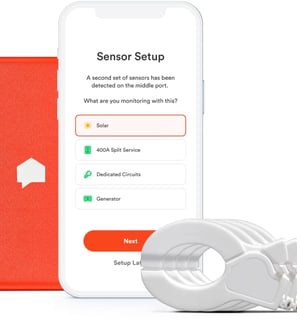Home Energy Monitoring: Is It Worth it?
Home energy monitoring systems can be a valuable tool for homeowners looking to save money, reduce waste and live more sustainable. While they're not without their drawbacks, their potential benefits make them worth considering - especially if you are committed to making data-driven changes.


Home energy monitoring is becoming an essential tool for homeowners looking to cut down on electricity bills and reduce their environmental impact. But is it worth the investment? Before making a decision, it's important to understand what a home energy monitoring system is and how it works.
A home energy monitoring system is a device that tracks electricity usage in real time. It provides insights into how much power your home consumes, which appliances use the most energy, and how you can adjust your habits to save money. Some advanced systems even integrate with smart home devices, allowing homeowners to automate energy-saving actions.
Understanding Home Energy Monitoring
How Does It Work?
Most home energy monitors connect to your electrical panel or individual outlets to measure energy consumption. They gather data and present it through an app or a web-based platform, showing energy usage patterns and identifying inefficiencies. With detailed reports and alerts, these systems help users take control of their electricity consumption.
The Benefits of Home Energy Monitoring
Is Home Energy Monitoring Worth It?
Installing a home energy monitor can bring multiple advantages, from cost savings to environmental benefits. Let’s explore why many homeowners find these devices worthwhile.
Home Energy Monitoring Systems: Are They Worth It?
While home energy monitoring offers many benefits, it’s not without its drawbacks. Here are some challenges to consider before investing in a system.
Challenges and Limitations
What Is a Home Energy Monitoring System?
Lowering Energy Bills
One of the biggest benefits of energy monitoring is reducing electricity costs. By identifying energy-hungry appliances and inefficient usage patterns, homeowners can make informed decisions on when and how to use their devices. For instance, you might find that running your washing machine during off-peak hours saves money or that an old refrigerator is consuming far more power than expected.
Reducing Carbon Footprint
Energy waste isn’t just costly—it’s also harmful to the planet. Home energy monitoring helps reduce unnecessary consumption, which directly translates to lower carbon emissions. Small changes, like turning off unused lights or adjusting thermostat settings, can significantly contribute to a greener lifestyle.
Identifying Energy-Hungry Appliances
Some appliances use far more electricity than we realize. A home energy monitor helps pinpoint which devices are driving up your energy bills. Whether it’s an inefficient HVAC system, an always-on gaming console, or an outdated water heater, knowing where your energy goes allows you to make smarter choices, like upgrading to energy-efficient models.
Initial Cost and Installation
A quality home energy monitoring system isn’t free. Prices vary depending on features, but high-end models can cost a few hundred dollars. Installation might also require professional help, adding to the expense. However, the potential savings over time may justify the upfront cost.
Learning Curve and Data Interpretation
Having access to energy data is great, but understanding it is another story. Some homeowners find energy reports overwhelming or too technical. While many apps simplify the information, those who are less tech-savvy may need time to adjust and learn how to use the data effectively.
Privacy and Security Concerns
Since energy monitors collect detailed data on household activity, privacy can be a concern. Some systems store information on cloud servers, which may pose risks if not properly secured. Choosing a reputable brand with strong security measures is essential to protect personal data.
Ultimately, whether a home energy monitor is worth it depends on your energy habits, goals, and budget.
When Does It Make Financial Sense?
If you have high electricity bills, live in an area with fluctuating energy rates, or use many appliances, an energy monitor can provide significant savings over time. By reducing waste and optimizing usage, the system can pay for itself within a few months to a couple of years.
Who Benefits the Most?
Homeowners with solar panels, electric vehicles, or smart home setups gain the most from energy monitoring. Those who actively want to reduce their carbon footprint or track energy trends will also find these systems beneficial. However, for people with low electricity consumption or fixed-rate energy plans, the benefits may be less noticeable.
Home energy monitoring can be a game-changer for those looking to cut electricity costs and reduce their environmental impact. While there are initial costs and a learning curve, the long-term benefits of lower bills, reduced carbon footprint, and greater control over energy use make these systems worthwhile for many homeowners. Whether or not it’s the right choice depends on your energy habits, budget, and willingness to optimize your power consumption.
Subscribe to our newsletter
Let's Connect
Sign up to the newsletter
© 2025. All rights reserved.










